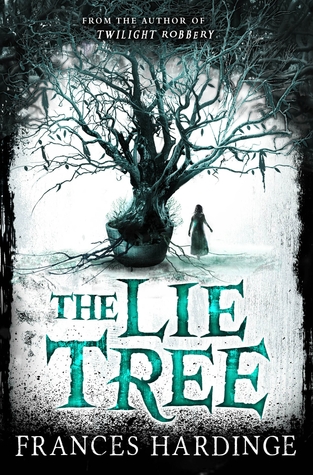Her earlier books were set in completely imaginary worlds, but her latest two have taken times and places from real history and magically transformed them. I loved what Cuckoo Song did with the 1920's.
The Lie Tree starts with England in the Nineteenth Century: Age of Scientific Discovery, when Geology and Darwin upended everything man believed about the world, when anyone could be an amateur botanist or paleontologist, when finding a new species of flower could make someone famous. A time when anything was possible, and everyone wanted to be the one to find it out.
(That spirit of discovery and possibility is a large part of why I think Steampunk is so popular; there was a naivety and excitement that somehow isn't possible in the cyber age, that we wish we could reclaim.)
Drop into this exciting atmosphere a family running away from scandal and ruin, with a daughter who would give anything to join her father in his scientific endeavours, to have her intelligence and curiosity valued. But she is a girl, so no one will take her seriously, most particularly not her father. Faith is Calpurnia Tate without an encouraging grandfather, and it's torture to watch her be rebuffed and belittled. She cannot blossom, but she still must grow, as a plant contorts itself to grow to the light.
Hardinge's female protagonists are another one of her amazing strengths. Faith (brilliant name, given all the themes of the book) is remarkable because she says and thinks and does some truly awful things that in any other character would make her thoroughly unlikeable—but she is so entirely justified that I ended up rooting for her all the way. Her anger, her hatred, her need for vengeance are all heart-breakingly understandable (as is her loyalty to someone who does not deserve it). She's smart and curious and analytical and rational and WHY CAN'T ANYONE VALUE THAT INSTEAD OF TELLING HER TO BE QUIET AND DEMURE???
So, major theme about gender equality, clearly (the nineteenth century is a great venue for that discussion). But it's all woven in with themes about everyone having depths: there isn't a single character who is what they appear to be. And almost everyone is deliberately pretending to be someone else in order to get what they want out of other people (not a scenario limited to the nineteenth century!). Lies, manipulation, betrayal, judgement: Faith is trying to figure out what is true and right but she's not getting much help from any of the adults around! It's deeply satisfying to watch her renegotiate all her relationships—with mother, father, brother, that annoying boy who keeps turning up—as she learns more truths about herself and everyone else.
The only fantastical element in this story is the Lie Tree itself, and I loved how it was presented as a scientific curiosity: discovered by an exploring botanist in a far-off land, with unique properties that need to be studied through experimentation. (Because, why not a plant that lives on lies? Giant flying lizards are real!) The Lie Tree is marvelously creepy—almost sentient, certainly evil—though it only has the evil people bring to it. And the evil people will do to try to get their hands on it.
Reading the synopsis, I wasn't sure this was a book I would like (I hate themes of social ostracism, and lying as a plot element generally makes me squidgy). But Hardinge made me like it. I loved her flawed, striving characters; I was absorbed in the time and place and atmosphere; the multi-layered plot more than fulfilled all its promises. Whenever I finish a Hardinge novel I always clutch it to my chest and say, "Yes!" I had to look up "satisfied" in the thesaurus, because it doesn't seem a strong enough word for how The Lie Tree made me feel. "Requited." That works. I loved this book and it loved me back.
Layered, meaty, satisfying, great British feel: I think Shepherd's Pie is the food metaphor of choice for this one.
 I tried to finish this post in time for Marvelous Middle-Grade Monday, since I haven't had an MMGM for a while. I didn't make it in time to get on Shannon Messenger's list, but you should go see what everyone else reviewed this week. I've discovered a number of favourite books there!
I tried to finish this post in time for Marvelous Middle-Grade Monday, since I haven't had an MMGM for a while. I didn't make it in time to get on Shannon Messenger's list, but you should go see what everyone else reviewed this week. I've discovered a number of favourite books there!
I've never read Francis Hardinge before, but I am intrigued by the nineteenth century setting. Your review is so thorough. I love books with multi-dimensional characters and the protagonist in particular sounds well drawn.
ReplyDeleteOh, you must, you must try Hardinge! But which one to start with? They're all so different. Pick the setting that appeals to you and go from there! (And try at least two—because they're so different, you might bounce off one and love another.)
DeleteI absolutely cannot wait to read this book. I had some issues with Frances Hardinge's early work, but I crazy crazy loved Cuckoo's Song and I am optimistic that The Lie Tree will be a similarly great reading experience.
ReplyDelete